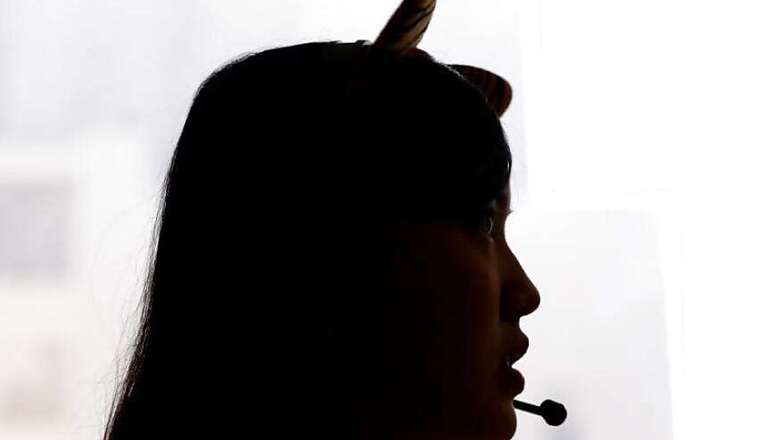
views
“Aggrieved woman” as identified under 2013 Act Prevention of Sexual Harassment has no respite in the digital workplace. She is working and facing family, financial crisis, increased household chores, perhaps domestic violence like all her female colleagues but the expectation to perform is the same for men and women. Given this context, her consent could have been taken in while shifting towards online space.
The activists working on the ground, counseling and mentoring women workers, specifically the women teachers in dealing with sexual harassment in a digital classroom according to the POSH Act 2013, found that the understanding of sexual harassment was in any case narrow, and with digital shift in the face of the pandemic it’s important to create awareness on what accounts for sexual harassment.
News18.com spoke to the activist Deepa Pawar, Founder of Anubhuti Charitable Trust on addressing the issues of sexual harassment in digital classrooms where the abuse is subtler and as grave as offline!
She pointed out the context of woman workers, teachers and absence of their consent. Excerpts.
As schools and colleges are holding classes online what kind of issues the teachers are facing that fall under the ambit of POSH Act 2013?
Expectations from teachers to perform without understanding what resources are available with them for the same, their home situation, etc. can be a kind of harassment. Definition of sexual harassment as per POSH Act 2013, includes creating a harmful environment for workers, which impedes their development, puts them under burden and pressure to perform. Online classes thus can be said to fall under this, which have been started without taking their consent.
If their workplace is creating unnecessary mental stress, if online classes have been started without providing them the necessary tools and understanding what their concerns are for the same, such burden to perform online can be said to fall under the ambit of POSH Act 2013.
You’ve also emphasized on the fact that our understanding of sexual harassment was extremely limited to definitions such as ‘forced sexual relationship’ or ‘sexual abuse’. How is this particular aspect adding to the anxiety of teachers?
Teachers have shared that they are feeling anxiety, inferiority complex, nervousness due to their performance being observed by many more stakeholders due to classes being held online. We don’t have data to support this, but as of now we can say this based on cases we are handling.
In Anubhuti’s survey in 2019 with 7 colleges of Thane District, a whopping 95% students did not know of their college ICC and an even larger number did not know about the POSH Act 2013. Only those teachers were aware of the ICC who were a part of it; majority of the rest confused it with the WDC or were not sure, or knew very little about it.
Understanding of sexual harassment was extremely limited to definitions such as ‘forced sexual relationship’ or ‘sexual abuse’. I said this because it was found that colleges are largely unaware of the widely defined understanding of sexual harassment as per this Act; this reflects in the way complaints are made (actually there were no complaints at all in the colleges we worked with), and responded to.
ICC members shared that their colleges were free of sexual harassment based on the fact that there were no complaints. Every teacher however said that they would be glad to have more training on the topic, and after the very first training shared with us their own experiences as young female teachers with their male students, or with colleagues, which they had never realized counted as sexual harassment. Teachers more male and female showed willingness to learn.
As academic activities are moving online how important is it to understand the application of POSH Act 2013 in the online world?
Yes, it is very important to see the online world as falling under the POSH Act 2013. As workplaces have moved online, there is even more probability of sexual harassment because there are newer and subtler ways in which the harassment can take place, without there being witnesses to it (unlike physical interactions). And in ways that will be more difficult to understand and pinpoint, as any way people have such limited understanding of sexual harassment even in the real world.
We also want to add that it seems that teachers are not being looked at as people who are also dealing with the pandemic like everyone else. Majority of professors who are female are dealing with the same issues of family, financial crisis, increased household chores, perhaps domestic violence like everyone else. But the way they are being expected to schedule online classes and complete the syllabus is certainly a burden.
What was the feedback from the women teachers?
The women teachers shared that they are facing a lot of challenges in converting their entire semesters online. Apart from the challenges of digital disparity and inequity in access to technology, the women teachers also shared that in the online space they have limited their expression and privacy.
Suddenly, they are under huge pressure to perform not only in front of students but also their parents who are also observing the online classes, their superiors and their own families.
As young women themselves, many teachers don’t have the kind of private space of their own in their homes where they can hold their classes online. Everything from their dress, speech, presentation, ability to hold online classes are being scrutinized and judged. There is huge pressure to perform perfectly despite the various logistical and other challenges. This can be said to be a form of harassment, as I’ve said earlier it was educational institutions that were shut down first, before any other workplaces or offices. While this was necessary, it was done in a way, and later decisions were made to hold classes online in a way without taking recommendations or consent of teachers.
Could you share some crucial observations during your workshops that you would like to suggest to the administration of the institutes?
Our recommendations to the administration would include the following points. Firstly, think beyond only online classes as the only option available. Plan strategically as to how to healthily complete the syllabus once lockdown starts lifting properly, instead of burdening themselves to finish the syllabus through online medium. Secondly, many female college students are at home. DV (domestic violence) cases are increasing during lockdown, which is affecting girls as much as women. Similarly, many workplaces, especially informal ones are continuing to operate, where many girls’ mothers work (eg. domestic work).
In this case, first of all, colleges need to ensure that the POSH Act 2013 is properly instituted in their institution by setting up functional ICCs and secondly, they should try to make their female students aware of their rights as per DV Act 2005, the POSH Act which protects their mothers and other family members who are continuing to work.
They must encourage platforms for discussions at college level so that students feel no shame in understanding and reporting sexual harassment. Colleges can increase their dialogues with each other to understand what problems are being faced due to the unprecedented crisis, classes being held online and working on solving them together.




















Comments
0 comment